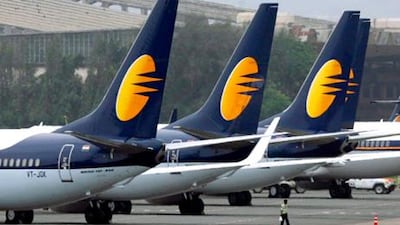Etihad Airways yesterday acquired almost a quarter stake in the Indian carrier Jet Airways, in a deal set to open up the subcontinent to a new era of airline competition.
The investment is the first in an Indian airline since the country's government eased restrictions on overseas carriers buying into its aviation industry last year.
Jet broke the news of the deal in a statement to the Bombay Stock Exchange yesterday, confirming it had sold 27.3 million new shares to Etihad at the equivalent of US$13.90 a share, subject to regulatory and shareholder approvals. Etihad later confirmed the deal.
"Etihad Airways of the United Arab Emirates and Jet Airways of India today announced that the UAE national carrier has agreed to subscribe for 27,263,372 new shares in Jet Airways at a price of 754.74 rupees per share. The value of this equity investment is $379m and will result in Etihad Airways holding 24 per cent of the enlarged share capital of Jet," Etihad said.
The price showed Etihad had paid a 31.7 per cent premium to Jet's closing share price on Tuesday of 573.85 rupees. Indian markets were closed yesterday.
"It's a game-changing opportunity for Etihad, and a game-changing opportunity for India," said Kapil Kaul, the regional head of the Centre for Asia Pacific Aviation, the aviation analyst. "Indian carriers need funds for expansion, to reduce debt and have enough liquidity to be able to manage operations in a tight economic environment."
In addition to the share purchase Etihad will commit $220m to create and strengthen the wide-ranging partnership between the two carriers. Part of that sum is the $70m to buy Jet's three pairs of Heathrow slots through the sale and lease-back agreement announced on February 27. Jet continues to operate flights to London utilising these slots.
An additional $150m will be invested by Etihad in Jet's frequent flyer programme, Jet Privilege. Final commercial agreements are expected to be completed within the next six months, subject to regulatory and corporate approvals.
The deal would bring "significant benefits and opportunities for global growth to both airlines", said Etihad's president and chief executive James Hogan.
"It is expected to bring immediate revenue growth and cost synergy opportunities, with our initial estimates of a contribution of several hundred million dollars for both airlines over the next five years," he said.
"The Indian market is fundamental to our business model of organic growth partnerships and equity investments. This deal will allow us to compete more effectively in one of the largest and fastest-growing markets in the world."
Under the strategic partnership, the airlines will gradually expand existing operations and introduce new routes between India and Abu Dhabi, driving traffic growth through Abu Dhabi International Airport, as well as Jet's hubs at Mumbai and Delhi airports.
They will combine their networks to offer a total of 140 destinations, with Jet establishing an Arabian Gulf hub in Abu Dhabi offering passengers from 23 cities in India direct connections to international destinations.
"A key component of the partnership is expanded code-sharing on flights with passengers benefiting from reciprocal rights on the airlines' frequent flyer programmes," said an Etihad spokesman.
"The proposed code-share expansion will enable Etihad to tap into India's rapidly growing travel market, providing additional passenger traffic to Etihad Airways' Middle Eastern, North American and European destinations, and give Jet Airways passengers from various cities access to an expanded network."
Current estimates predict the size of the Indian market to grow to 42 million travellers over the next five years at a rate of 10 per cent per year, while the Indian middle class, which provides the majority of air travel demand, is forecast to grow by 200 million, over the next eight years.
Etihad Airways currently flies to nine Indian destinations, with a total of 59 flights per week.
Key benefits for both airlines will flow from synergies and cost savings in areas including fleet acquisition, maintenance, product development and training.
The airlines will explore joint purchasing opportunities for fuel, spare parts, equipment and catering supplies, as well as external services such as insurance and technology support.
Mumbai-based Jet, founded in 1993, and controlled by the London-based Indian entrepreneur Naresh Goyal, has struggled to make a profit.

